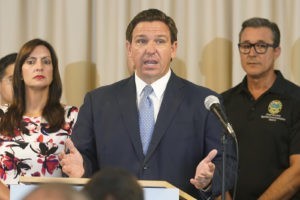The political fight over COVID-19 restrictions now has found its way into the debate over taxpayer funded vouchers for private religious schools.
ABC News reported Aug. 6 that the Florida State Board of Education will offer private school vouchers to parents who say a public school district’s mask-wearing requirements equate to harassment of their children.

Florida Gov. Ron DeSantis answers questions related to school openings and the wearing of masks, Tuesday, Aug. 10, 2021, in Surfside, Fla. (AP Photo/Marta Lavandier)
Florida Gov. Ron DeSantis has staked a claim as one of the nation’s most controversial governors by downplaying the severity of the pandemic and limiting what schools and businesses can do to mitigate its spread. He has appealed to the far-right base of the Republican Party, which more than any other segment of the population believes the pandemic is a hoax and that public health requirements such as vaccines and face masks are attacks on individual liberty.
DeSantis also is a longtime supporter of efforts to expand school privatization, saying parents should be able to decide how to provide for their children’s health and education even by allocation of state funds. Using taxpayer funds to prop up religious schools generally has been ruled unconstitutional by courts, but it remains a top agenda for evangelical and Catholic conservatives.
ABC reported: “DeSantis had ordered the state Education Department to come up with ways to pressure school districts against creating mask mandates and punish them if they do. He said the rules could include withholding money from school districts or other actions allowed under Florida law.”
The Education Board interpreted an existing law to say that eligibility for the Hope Scholarship, which is meant to protect children against bullying, would be expanded to include “COVID-19 harassment” as a prohibited form of discrimination.
Such COVID harassment is defined by the board as “any threatening, discriminatory, insulting or dehumanizing verbal, written or physical conduct” students suffer as a result of COVID-19 protocols such as mask or testing requirements and isolation measures that “have the effect of substantially interfering with a student’s educational performance.”
The Education Board said eligibility for a scholarship meant to protect children against bullying would be expanded to include “COVID-19 harassment” as a prohibited form of discrimination.
The Florida Department of Health has issued a ruling that students may wear masks, but school districts must allow parents to opt their children out of any local mandates.
Meanwhile, a group of Florida parents has filed suit in Miami federal court against DeSantis, the state Department of Education and some of the state’s largest school districts, claiming the ban on mask mandates violates the Americans with Disabilities Act. They contend their disabled children will be unable to attend public schools with unmasked classmates because they are at high risk of COVID-19 infection.
Before the Florida ruling, the stakes over private school vouchers already had been raised by the U.S. Supreme Court, which announced July 2 that it will hear a case brought by families from Maine who want to use a state tuition program to send their children to religious schools. That case is called Carson v. Makin.
Opponents of government-funded vouchers for private religious schools base their arguments on church-state separation grounds as well as general support for public education as necessary to the common good. They believe government should not fund private schools that favor one religious belief over another, a key tenet of the First Amendment. They also believe private school vouchers take urgently needed money away from public schools.
In the Maine case, families who want to send their children to Christian schools in Bangor and Waterville sued to get access to vouchers, but they were denied in lower federal courts. They appealed to the U.S. Supreme Court, which will take up the case in its new term that begins in October.
The Associated Press reported that Institute for Justice, a libertarian law firm, will represent the families. Lead attorney Michael Bindas described the case as a “potentially landmark case.”
“Parents are free to send their children to such schools if they choose, but not with public dollars.”
Maine Attorney General Aaron Frey told AP that religious schools are excluded from the program “because the education they provide is not equivalent to” public education. “Parents are free to send their children to such schools if they choose, but not with public dollars. I am confident that the Supreme Court will recognize that nothing in the Constitution requires Maine to include religious schools in its public education system.”
Already, a more conservative majority on the Supreme Court has tilted toward allowing public funding for private religious schools. Recent rulings in Missouri and Montana have illustrated this trend.

Rachel Laser
Rachel Laser, president of Americans United for Separation of Church and State, agreed that the Maine case could significantly affect the laws around religious freedom and church-state separation.
“One of America’s most basic principles is that we can all freely choose our religion, or no religion at all. The separation of church and state is what protects this freedom for all of us,” she said. “One of the core reasons our country’s founders insisted on church-state separation was to ensure taxpayers are not forced to pay for the private religious education of others.
“The Supreme Court chipped away at this protection last year when it required states to include religious schools in private school voucher programs. If this court is to maintain any semblance of adhering to the Constitution and the intent of its framers, it should not cross this final line of requiring taxpayers to pay for religious instruction.”
Related articles:
Trump executive order diverts federal funds to private school vouchers under cover of COVID-19
Private school vouchers as civil rights? Baloney! | Opinion by Charles Foster Johnson
School voucher proponents are using the COVID-19 crisis to push for taxpayer money for religious education | Opinion by Jennifer Hawks


